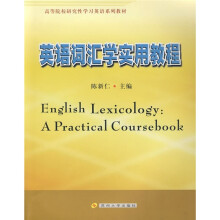Unit1 Preliminaries about Lexicology
Pre-Class Reading
1.1 Lexicology as a branch of linguistic study
1.2 The vocabulary of a language
1.3 Words as main units of the English vocabulary
1.4 Lexical knowledge
1.5 Lexical competence
In-Class Activities
Post-Class Tasks
Proiect Work
Unit2 The Formation of English Words
Pre-Class Reading
2.1 Morphemes in English
2.2 Major processes of word formation in English
2.3 Other processes of word formation in English
In-Class Activities
Post-Class Tasks
Project Work
Unit3 The Grammatical Aspect of English Words
Pre-Class Reading
3.1 Word classes in English
3.2 Countable nouns vs. uncountable nouns
3.3 Transitive verbs vs. intransitive verbs
3.4 Dynamic verbs vs. stative verbs
In-Class Activities
Post-Class Tasks
Project Work
Unit4 The Idiomatic Aspect of English Word Combinations
Pre-Class Reading
4.1 Chunks in English
4.2 Collocations in English
4.3 Idioms in English
4.4 Proverbs in English
In-Class Activities
Post-Class Tasks
Project Work
Unit5 The Semantic Tgpes of English Words
Pre-Class Reading
5.1 Concrete words vs. abstract words
5.2 Proper nouns vs. common nouns
5.3 Descriptive words vs. evaluative words
5.4 Fuzzy words and hedges
In-Class Activities
Post-Class Tasks
Proiect Work
Unit6 The Semantic Networks of English Words
Pre-Class Reading
6.1 Semantic networks
6.2 Semantic fields
6.3 Superordinates vs. hyponyms
6.4 Meronyms vs. holonyms
6.5 Lexical gaps
In-Class Activities
Post-Class Tasks
Project Work
Unit7 The Semantic Relations among English Words
Pre-Class Reading
7.1 Synonyms and synonymous expressions
7.2 Antonyms and antonymous expressions
7.3 Polysemous words vs. homonymous words
7.4 Semantic relations and textual organization
In-Class Activities
Post-Class Tasks
Project Work
Unit8 The Emotional Aspect of English Words
Pre-Class Reading
8.1 Appreciative words VS.derogatory words
8.2 Semantic prosody of some words
8.3 Other lexical devices to convey affeet
In-Class Activities
Post-Class Tasks
Project Work
Unit9 The Stglistic Aspect of English Words
Pre-Class Reading
9.1 Style and formality
9.2 Genre and vocabulary
9.3 Technical terms in English
In-Class Activities
Post-Class Tasks
Project Work
Unit10 The Social Aspect of English Words
Pre-Class Reading
10.1 Gender and English words
10.2 Honorifics in English
10.3 Euphemisms in Englistl
In-Class Activities
Post-Class Tasks
Project Work
Unit11 The Cultural Aspect of English Words
Pre-Class Reading
11.1 Color terms an(1 culture
11.2 Numerals and culture
11.3 Euphemisms and culture
11.4 Idioms and culture
In-Class Activities
Post-Class Tasks
Project Work
Unit12 The Cognitive Aspect of English Words
Pro-Class Reading
12.1 Literal and figurative use of vocabulary
12.2 Metaphoric mechanism in the English vocabulary
12.3 Metonymic mechanism in the English vocabulary
12.4 English discourse markers
In-Class Activities
Post-Class Tasks
Proiect Work
Unit13 The Change of English Words
Pre-Class Reading
13.1 Semantic change of English words
13.2 Morphological change of English words
13.3 Grammatical change of English words
13.4 Cyber vocabulary
13.5 Catchy words in English
In-Class Activities
Post-Class Tasks
Proiect Work
Unit14 The Loan Words in English
Pre-Class Reading
14.1 Words borrowed from Latin and Greek
14.2 Words borrowed from French
14.3 Words borrowed from other Indo-European languages
14.4 Words borrowed from Chinese and Japanese
14.5 Nativization of English words in China
In-Class Activities
Post-Class Tasks
Proiect Work
Unit15 Learning the English Vocabulary
Unit16 The Tgpes and Components of Dictionaries
References
Glossary

 缺书网
缺书网 扫码进群
扫码进群




